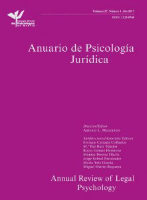
LAW AND HUMAN BEHAVIOR
Scope & Guideline
Pioneering Research on Law's Impact on Human Behavior
Introduction
Aims and Scopes
- Legal Psychology Applications:
Research that applies psychological principles to understand legal processes, such as jury decision-making, eyewitness testimony, and the effects of mental health on legal competency. - Behavioral Analysis in Legal Contexts:
Studies examining the behavior of various legal actors, including defendants, victims, jurors, and law enforcement personnel, often focusing on biases and decision-making processes. - Impact of Social and Racial Factors:
Exploration of how social identity, race, and ethnicity influence perceptions of justice, legal outcomes, and the treatment of individuals within the legal system. - Mental Health and the Legal System:
Investigations into the intersection of mental health issues and legal processes, including competency evaluations, the treatment of mentally ill offenders, and implications for sentencing. - Criminal Justice Interventions:
Research focusing on interventions within the criminal justice system, including risk assessments, rehabilitation strategies, and the effectiveness of legal reforms.
Trending and Emerging
- Implicit Bias and Legal Decision-Making:
A growing body of research is focusing on implicit bias, particularly how it influences the decisions of legal actors, such as jurors and law enforcement, reflecting broader societal discussions on race and equity. - Mental Health Interventions in Criminal Justice:
Emerging themes highlight the need for mental health interventions within the criminal justice system, emphasizing the importance of addressing mental health issues among offenders and victims. - Technology in Legal Processes:
An increasing interest in the role of technology, including the use of body-worn cameras and telepsychology, is evident, suggesting a shift towards integrating technological advancements into legal practices. - Cultural Competency in Forensic Assessments:
Research focusing on culturally competent practices in forensic assessments is on the rise, indicating a trend towards recognizing the importance of cultural factors in legal psychology. - Victimology and Legal Outcomes:
The study of victim experiences and their influence on legal outcomes, including victim impact statements and their role in sentencing, has gained prominence, reflecting a more victim-centered approach in legal research.
Declining or Waning
- Traditional Forensic Assessment Tools:
There appears to be a waning focus on established forensic assessment tools, as newer methodologies emphasizing culturally informed and context-sensitive approaches gain traction. - Generic Legal Education Approaches:
Research discussing generic educational frameworks for legal professionals has become less frequent, indicating a shift towards more specialized and practical training methodologies. - Exploration of Historical Legal Practices:
Studies investigating historical legal practices and their psychological implications have diminished, suggesting a move toward contemporary issues and current legal challenges. - Standardized Testing in Legal Contexts:
The use of standardized psychological testing in legal assessments is declining, with a growing preference for qualitative approaches that consider individual circumstances and biases. - Disciplinary Outcomes in Educational Settings:
Research related to disciplinary outcomes in educational contexts, such as school-to-prison pipelines, has lessened, possibly overshadowed by broader criminal justice reform discussions.
Similar Journals

INTERNATIONAL JOURNAL OF LAW AND PSYCHIATRY
Navigating the Confluence of Justice and Mental WellnessThe INTERNATIONAL JOURNAL OF LAW AND PSYCHIATRY, published by PERGAMON-ELSEVIER SCIENCE LTD, stands as a pivotal resource in the intersection of legal studies and psychological research. With an ISSN of 0160-2527 and E-ISSN 1873-6386, this journal covers a broad spectrum of topics from the complexities of mental health law to the implications of psychiatric assessments in jurisprudence, making it a valuable asset for researchers and practitioners alike. It enjoys impressive rankings, placing in the top quartiles across multiple categories in the 2023 Scopus index: Q1 in Law and Pathology & Forensic Medicine, and Q2 in Psychiatry and Mental Health, highlighting its significance and impact in these fields. This journal, accessible to scholars globally, fosters important discussions and advancements in understanding the interrelation of law and mental health, providing a forum for innovative research and critical reviews. With publication convergence spanning from 1978 to 2024, it continues to shape the discourse in law and psychiatry and remains essential for anyone seeking to stay informed on contemporary issues and research in these dynamic fields.

International Journal of Criminal Justice Sciences
Bridging theory and practice in criminal law.The International Journal of Criminal Justice Sciences is a premier academic publication dedicated to advancing the field of criminal justice through rigorous research and innovative scholarship. Published by MANONMANIAM SUNDARANAR UNIVERSITY in India, this Open Access journal has been a vital platform for researchers since 2006, promoting unrestricted access to critical knowledge and insights in the realm of law and criminal justice. With a commendable Scopus ranking of #379 out of 1025 in the Social Sciences - Law category, placing it in the 63rd percentile, it holds an essential position for those engaged in legal studies. The journal is particularly beneficial for academics, practitioners, and students aiming to explore contemporary issues, innovative practices, and theoretical advancements in the discipline. Its commitment to quality research is reflected in its Q3 Quartile designation and the continuous convergence of research contributions anticipated from 2017 to 2024. Whether you are looking to publish your findings or seek valuable insights from peer-reviewed articles, the International Journal of Criminal Justice Sciences remains an indispensable resource for fostering knowledge and dialogue in this critical field.

Revista General de Derecho Penal
Innovating legal perspectives on criminality.Revista General de Derecho Penal, published by IUSTEL, is a premier academic journal dedicated to the dynamic field of criminal law. With an ISSN of 1698-1189, this journal serves as a crucial platform for researchers, legal professionals, and students to share their insights and findings related to penal law and its evolving applications in contemporary society. Although it is not an open access journal, it maintains high scholarly standards, helping to advance discourse in legal studies. The journal's address is C PRINCESA NO 29, 2A DCHA, MADRID 28008, SPAIN, positioning it within a vibrant academic community. With a focus on current legal challenges and theoretical advancements, Revista General de Derecho Penal plays an essential role in fostering understanding and developing effective legal frameworks in criminal justice, making it an invaluable resource for those engaged in the study and practice of law.

Justicia
Exploring contemporary challenges in law and governance.Justicia, a distinguished academic journal published by UNIV SIMON BOLIVAR, serves as a vital platform for the dissemination of research within the fields of law, political science, and social justice. Since its transition to Open Access in 2014, it has broadened its reach, enabling scholars, practitioners, and students from around the globe to engage with high-quality research unrestricted by subscription barriers. Located in Barranquilla, Colombia, the journal aims to foster interdisciplinary dialogue and innovation by publishing original articles, reviews, and case studies that reflect contemporary legal challenges and social issues. With its commitment to elevating discussions on justice and governance, Justicia plays a crucial role in shaping legal scholarship and influences policy-making, making it an essential resource for anyone dedicated to understanding and contributing to the field.

Anuario De Psicologia Juridica
Exploring the Nexus of Psychology and Law.Anuario De Psicologia Juridica is a prestigious academic journal published by the COLEGIO OFICIAL PSICOLOGOS MADRID, specializing in the intersection of psychology and law. Since becoming an Open Access publication in 2013, the journal has made significant strides in expanding access to high-quality research, thereby fostering knowledge dissemination and engagement in the fields of Applied Psychology, Law, and Forensic Medicine. With a notable impact factor and categorized as Q3 in Applied Psychology, Q1 in Law, and Q2 in Pathology and Forensic Medicine, it stands out for its contributions to the evolving nature of forensic psychology and legal assessment. As of 2023, the journal is ranked in the 90th percentile among law journals and in the 58th percentile among pathology and forensic medicine, underscoring its relevance and authority. Researchers, professionals, and students will find Anuario De Psicologia Juridica to be an invaluable resource for cutting-edge research and practical applications that aim to bridge psychological theories with legal practices.

FORDHAM LAW REVIEW
Defining the Future of Law Through Rigorous ScholarshipFORDHAM LAW REVIEW is a prestigious legal journal published by Fordham University, School of Law, based in the United States. Established to disseminate cutting-edge legal scholarship, this journal has consistently achieved an impactful standing within the field, evidenced by its category ranking as Q1 in Law for 2023 and its Scopus ranking of #428 out of 1025 in the Social Sciences Law category, placing it in the 58th percentile. The journal welcomes submissions across diverse legal topics, fostering discourse that advances both legal theory and practice. Although it does not currently offer open access options, the Fordham Law Review serves as a vital resource for scholars, practitioners, and students seeking insights into contemporary legal challenges and developments. With its rich publication history dating back to the converged years of 1973 through 2024, the journal continues to be a cornerstone for rigorous legal analysis and a platform for influencing the evolution of law.

European Journal of Psychology Applied to Legal Context
Fostering Collaboration Between Psychology and Legal ExpertsThe European Journal of Psychology Applied to Legal Context, published by the COLEGIO OFICIAL PSICOLOGOS MADRID, is a premier open-access journal that has been contributing to the interdisciplinary fields of psychology and law since its inception in 2009. With an E-ISSN of 1989-4007, the journal has established itself as a leading outlet for innovative research, boasting impressive Scopus rankings—3rd in Social Sciences (Law) and 9th in Psychology (Applied Psychology), both within the prestigious Q1 quartile category for 2023. This significant impact reflects the journal's commitment to advancing scholarly understanding and application of psychological principles in legal contexts, making it an essential resource for researchers, professionals, and students. Distributed globally, the journal offers unrestricted access to its articles since 2013, aligning with the shared goal of enhancing knowledge and fostering collaboration among diverse academic and professional communities. By bridging the gap between psychological research and legal practice, the European Journal of Psychology Applied to Legal Context plays a crucial role in shaping policy, guiding best practices, and informing education in both fields.

Journal of Criminal Psychology
Advancing understanding of crime through psychological insights.Journal of Criminal Psychology, an esteemed publication by EMERALD GROUP PUBLISHING LTD, serves as a pivotal resource in the interdisciplinary study of criminal behavior through the lenses of psychology and law. Since its inception in 2011, this journal has significantly contributed to the understanding of psychological principles as they apply to crime, law enforcement, and social justice, making it a vital source for both researchers and practitioners. With a commendable ranking of Q1 in Law and Q3 in Applied and Social Psychology for 2023, the journal guarantees high-quality research findings that can influence policy and practice across these domains. Although it does not offer open access, its rigorous peer-review process ensures that every published article adheres to the highest academic standards. The Journal of Criminal Psychology not only fosters academic discourse but also drives innovation in criminal justice practices, making it essential reading for anyone dedicated to the enhancement of ethical standards in legislation and law enforcement.

SYDNEY LAW REVIEW
Unpacking the Complexities of Legal FrameworksSYDNEY LAW REVIEW is a prestigious academic journal published by the Sydney Law School, dedicated to the field of legal studies and interdisciplinary analysis of law and its impact on society. With its ISSN 0082-0512 and E-ISSN 1444-9528, this journal serves as a vital resource for legal scholars, researchers, and practitioners in Australia and globally. The journal has undergone several phases since its inception in 1990, reflecting the evolving landscape of legal scholarship and policy. Although currently not an open-access publication, it remains a significant contributor to legal discourse, maintaining a Q4 ranking in the Law category as per the 2023 category quartiles. The SYDNEY LAW REVIEW encourages submissions that critically explore contemporary legal issues, thereby fostering a robust platform for academic inquiry and professional advancement.

Journal of International and Comparative Law
Connecting Scholars to Contemporary Legal ParadigmsThe Journal of International and Comparative Law is a premier academic publication dedicated to advancing knowledge and sparking critical discourse in the field of law. Published by SWEET & MAXWELL, this journal aims to bridge the gap between international legal standards and comparative practices, making it an essential resource for legal scholars, practitioners, and students alike. With an impact factor that positions it in the Q3 category of legal journals and a Scopus rank of #534 out of 1025 in the Social Sciences - Law category, it is recognized for its contribution to the legal community since its inception in 2018. The journal, based in Hong Kong, seeks to publish high-quality, peer-reviewed articles that reflect a diverse range of legal perspectives and methodologies. Although the journal is not open access, it remains committed to disseminating vital research and case studies that shape contemporary legal paradigms. Scholars and legal professionals can stay informed on authoritative insights by engaging with this important resource until 2024 and beyond.